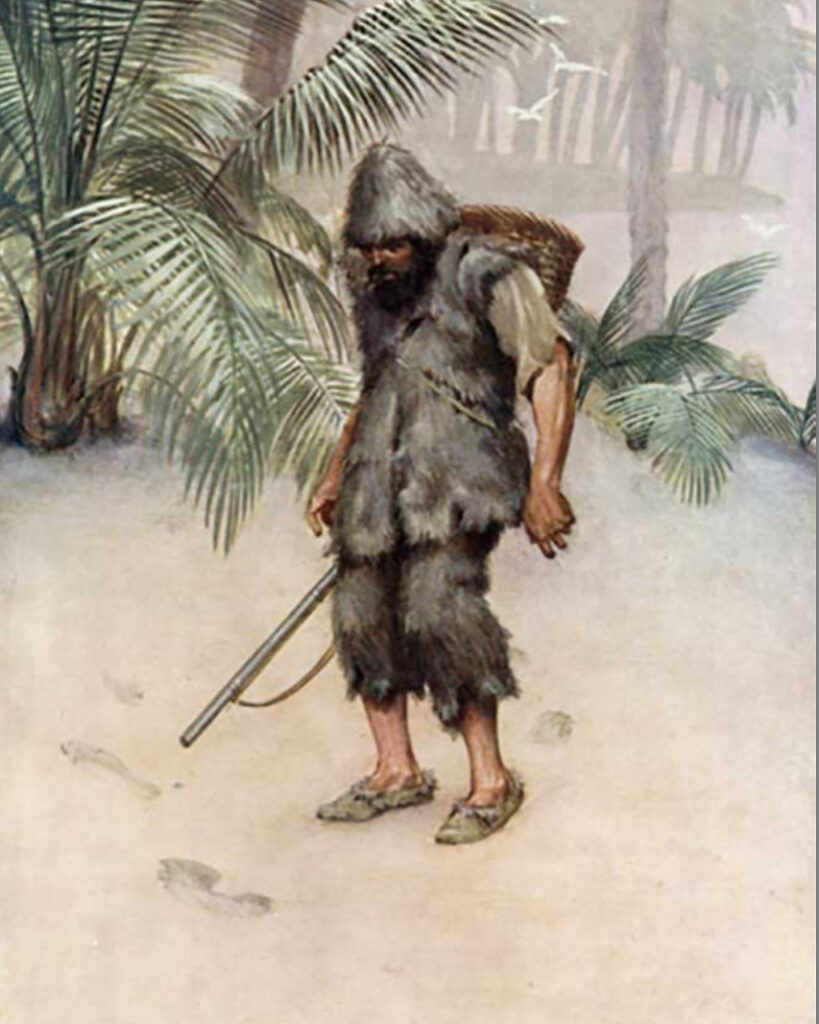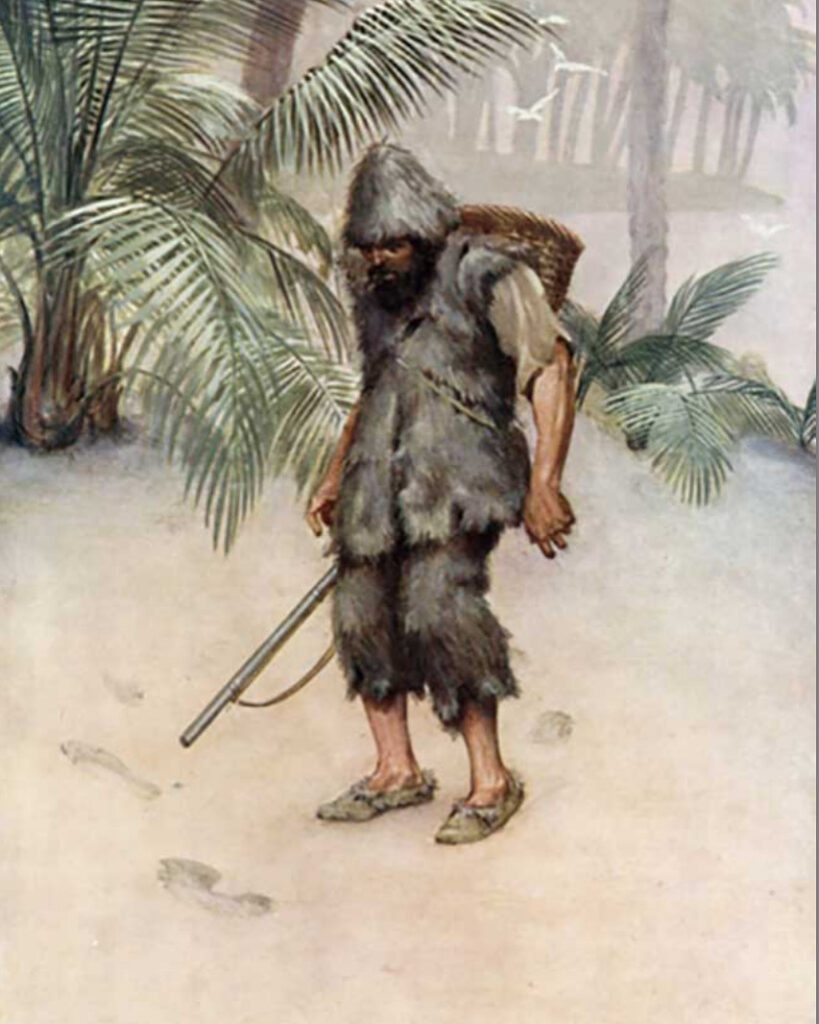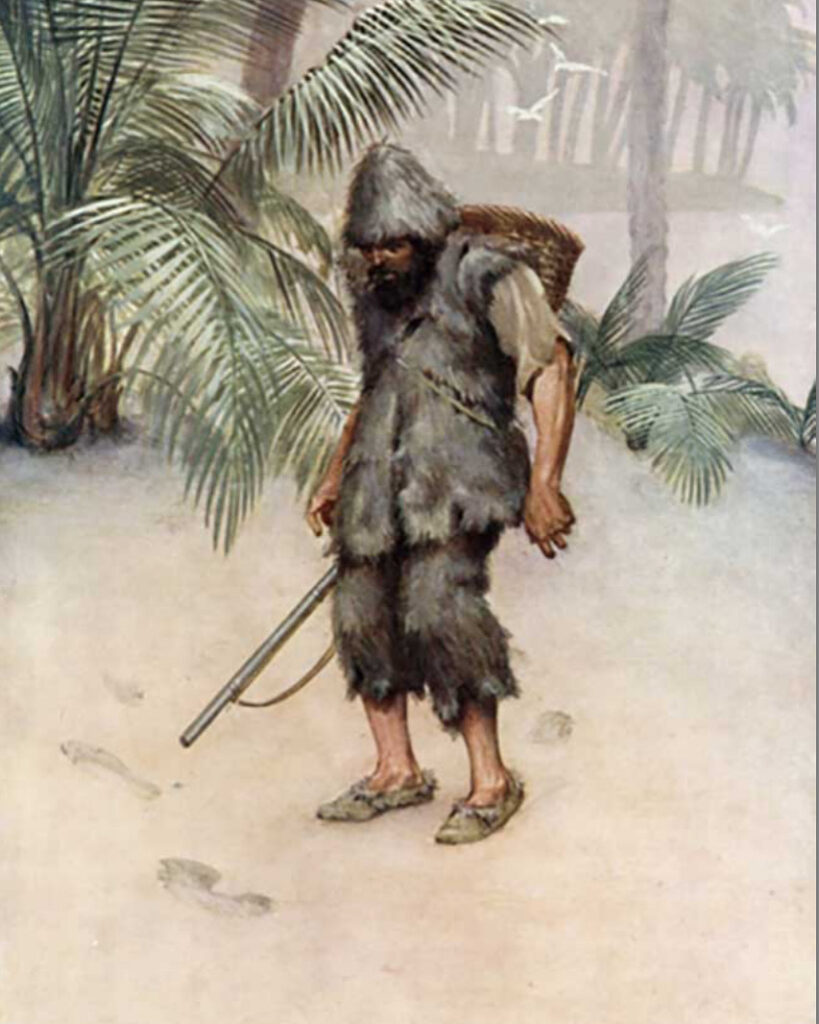
de Daniel Defoe
Am nevoie de ceva timp să mă pregătesc pentru călătorie. Trebuie să planific ce să iau cu mine.
Dar apoi văd că nu trebuie să iau multe lucruri.
Mă hotărăsc să-mi iau câinele, papagalul, cartea și alte lucruri mărunte. Iau și banii, aurul și argintul. În sfârșit imi sunt de folos.
Mă întâlnesc din nou cu prizonierii. Le arăt porumbul și animalele mele. Și le spun despre insulă. Apoi merg la bordul navei.
Părăsim insula în decembrie 1686. Sunt douăzeci și șapte de ani de la primul meu pas pe insulă.
În primul rând, mergem pe insula unde locuiesc oamenii lui Vineri. Marinarii spanioli și portughezi sunt foarte bucuroși când ne văd. Sunt fericiți că avem o navă. Acum nu trebuie să construim o navă nouă. Putem merge în Europa.
Și câinele meu este foarte fericit. Când vede pe unul dintre marinarii spanioli, fuge la el foarte repede. El sare pe marinar. El este extrem de fericit.
Marinarul spaniol este proprietarul lui. Este și el foarte fericit. Începe să plângă când își vede câinele. Este o întâlnire foarte emoționantă.
Marinarii încep să se pregătească pentru călătoria peste ocean. Vineri trebuie să ia o decizie. El poate sta cu oamenii lui, sau poate merge cu mine în Europa. Are nevoie de ceva timp să se gândească la asta. Rămânem pe insulă peste noapte.
Dimineața, îl întreb Vineri dacă știe ce vrea să facă. Îmi spune că vrea să meargă cu mine în Europa. Pregătește totul pentru călătorie. Suntem gata de plecare. Ne începem călătoria.
Două luni mai târziu, după o călătorie sigură peste ocean, ajungem la Londra. Pentru mine este după treizeci și cinci de ani.
Se pare că întreaga lume este diferită după acești ani. Unele părți ale Londrei sunt noi.
Există câteva case noi, străzi, drumuri, magazine, parcuri și un pod mare peste râu. Dar nu este totul. Oamenii sunt diferiți. Au haine diferite. Femeile au stil de păr diferit. Bărbații au pălării diferite și tipuri noi de arme.
Oamenii folosesc instrumente noi pe care nu le cunosc. Au nume noi pentru aceste instrumente. Totul este foarte interesant. Stilul de muzică în cârciumi este, de asemenea, diferit. Aud melodii noi. Îmi place acest stil nou. Vreau să cânt aceste melodii noi.
Din Londra mă întorc în orașul meu, York. Părinții mei sunt amândoi morți. Găsesc niște rude. Sora mea, unchiul meu și mătușa mea sunt încă în viață. Sunt fericiți când mă văd. Ei au crezut că sunt mort de mult. Deci nu am drepturi asupra banilor sau pământului familiei. Dar pot să stau și să locuiesc în casa lor.
Anglia este un șoc mare pentru Vineri. Totul este atât de nou pentru el. Totul este foarte interesant pentru el. Îi place această nouă experiență.
Ceea ce nu-i place este vremea rece iarna. Este februarie. Nu îi plac zăpada și gheața. Nu înțelege de ce trăim în asemenea condiții. Îi spun că vara vremea este mult mai bună.
Trimit o scrisoare în Brazilia. Îmi amintesc încă foarte bine adresa. Vreau să contactez oameni din Brazilia. Vreau să știu dacă soția mea este încă în viață. Vreau să știu dacă plantația mea mai există. Dar nu știu la ce să mă aștept după atâția ani.
În mai, primesc o scrisoare și niște pachete de la soția mea. Ea îmi scrie cuvinte frumoase. Ea scrie despre vremuri când m-a așteaptat. Dar la 10 ani de la plecarea mea, ea nu a crezut că sunt în viață. S-a căsătorit din nou și are o nouă familie. Soțul ei a fost bolnav și a murit. Sunt deja doi ani. Acum, ea trăiește fără soț.
Primesc și o scrisoare de la tatăl soției mele. Este foarte bătrân, dar încă în viață. În scrisoarea lui, el scrie despre cheltuieli și profitul din plantația mea în toți acești ani.
Amândoi îmi trimit multe cadouri frumoase. Mi-au trimis niște piei frumoase și o cutie mică plină cu aur. Îmi trimit și niște cutii cu zahăr să le vând.
Soția mea are și o mare surpriză pentru mine. Ea scrie că am un fiu. Este o veste grozavă. Este născut la opt luni după plecarea mea. Acum este un om mare și vrea să mă cunoască.
Se întâmplă atât de multe lucruri într-un timp scurt. Nu pot să cred că totul este adevărat. Vreau să plâng. Apoi vreau să râd. Toate emoțiile sunt prea mari pentru mine. Nu pot fi calm. Mă ridic în picioare. Mă așez. Mă ridic din nou. Mă plimb prin cameră. Râd. Apoi plâng din nou.
Când sunt puțin calm, mă gândesc ce să fac.
in English:
I need some time to prepare for the journey. I need to plan what to take with me.
But then I see that I don’t need to take many things.
I decide to take my dog, my parrot, my book and some other small things. I also take the money, gold and silver which are from the ships. They are finally useful to me.
I meet with the prisoners again. I show them my corn and my animals. And I tell them about the island. Then I go on board the ship.
We leave the island in December, 1686. It’s twenty-seven years after my first step on the island.
First, we go to the island where Friday’s people live. The Spanish and Portuguese sailors are very happy when they see us. They are happy that we have a ship. Now we don’t have to build a new ship. We can go to Europe.
My dog is very happy too. When he sees one of the Spanish sailors, he runs to him very quickly. He jumsp on him. He is extremely happy.
The Spanish sailor is his owner. He is very happy too. He starts to cry when he sees his dog. It’s a very emotional meeting.
The sailors start to prepare for our journey across the ocean. Friday has to make a decision. He can stay with his people. Or he can go to Europe with me. He needs some time to think about it. We stay on the island one night.
In the morning, I ask Friday if he knows what to do. He tells me that he wants to go with me to Europe. He prepares everything for the journey. We are ready to go. We start our journey.
Two months later, after a safe journey across the ocean, we arrive to London. For me it’s after thirty-five years.
It looks like the whole world is different after those years. Some parts of London are new.
There are some new houses, streets, roads, shops, parks and big bridge across the river. But it isn’t all. People are also different. They have different clothes. Women have different hair style. Men have different hats and new types of guns.
People use new tools which I don’t know. They have new names for these tools. It’s all very interesting. The style of music in the pubs is also different. I hear new songs. I like this new style. I want to sing these new songs.
From London I return to my town, York. My parents are both dead. I find some relatives. My sister, my uncle and my aunt are still alive. They are happy when they see me. But they think that I’m long dead. So I have no rights to family’s money or land. But I can stay and live in their house.
England is a big shock to Friday. Everything is so new for him. It’s all very interesting for him. He likes this new experience.
What he doesn’t like is the cold weather in winter. It’s February. Snow and ice aren’t good for him. It isn’t logical for him why we live in such conditions. I tell him that in summer the weather is much better.
I send a letter to Brazil. I still remember the address very well. I want to contact people in Brazil. I want to know if my wife is still alive. I want to know if my plantation still exists. But I don’t know what to expect after so many years.
In May, I get a letter and some packets from my wife. She writes nice words to me. She writes about times when she waits for me. But 10 years after my departure, she doesn’t believe that I’m alive. She marries again and she has a new family. But her new husband is ill and he dies. It’s already two years. Now, she lives without a husband.
I also get a letter from my wife’s father. He is very old but still alive. In his letter, he writes expenses and profit from my plantation during all these years.
They both send me many nice presents. They send me some nice skins and a little box full of gold. They also send me some boxes of sugar to sell.
My wife has also a big surprise for me. She writes that I have a son. It’s great news. He is born eight months after my departure. He is now a big man and he wants to meet me.
So many things happen in a short time. I can’t believe that it’s all true. I want to cry. Then I want to laugh. All the emotions are too much for me. I’m not able to be calm. I stand up. I sit down. I stand up again. I walk around the room. I laugh. Then I cry again.
When I’m a little calm, I think about what to do.




